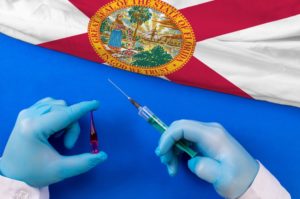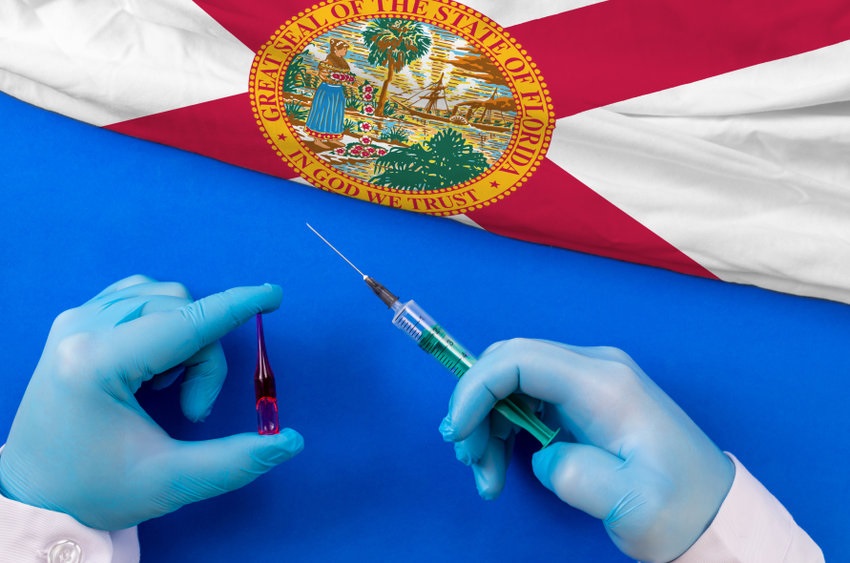In response to President Biden’s vaccine mandates (which we covered in prior blogs, available here), Governor Ron DeSantis passed a new law designed to broaden the exemptions available against Florida private employers vaccine mandates for COVID-19.
On November 19, 2021, Governor DeSantis signed into law House Bill HB-1B, which became Florida Statute § 381.00317, also referred to as Florida’s Private Employer Vaccine Mandate Program. Many have viewed this as stopping employers from mandating vaccines. This is not the case.
 Instead, the law forces private employers with COVID-19 vaccine mandates to accept additional types of vaccination exemptions other than what are allowed by federal law. Federal law only provides for exemptions from vaccines based on sincerely held religious beliefs or as a medical accommodation.
Instead, the law forces private employers with COVID-19 vaccine mandates to accept additional types of vaccination exemptions other than what are allowed by federal law. Federal law only provides for exemptions from vaccines based on sincerely held religious beliefs or as a medical accommodation.
On December 2, 2021, the Florida Department of Legal Affairs issued an emergency rule which further clarified some of the language of the new law. Here’s what you need to know:
Who does this law apply to?
Florida Statute Section § 381.00317 applies to all employers regardless of size and all employees who are not independent contractors, volunteers, or those who serve in a private non-profit agency without compensation.
When does it go into effect and for how long?
The new law took effect on November 19, 2021, and its private employer provisions are currently set to expire on June 1, 2023.
What does the new law require?
Florida Statute § 381.00317 forbids a private employer from imposing a COVID-19 vaccination mandate on “any full-time, part-time, or contract employee without providing individual exemptions that allow an employee to opt out of such requirement” based on the following:
- Medical reasons, including, but not limited to, pregnancy or anticipated pregnancy;
- Religious reasons;
- COVID-19 immunity (i.e. you previously had the infection and have antibodies to the virus);
- Periodic COVID-19 testing; and
- The use of employer-provided personal protective equipment, like masks and face shields.
What is needed to support these additional exemptions?
To qualify for these exemptions, employees will be required to provide the following information in support of their exemption requests, as explained below:
- Pregnancy/Anticipated Pregnancy: A physician, physician assistant, or advanced practice registered nurse who has examined the patient must date and sign the exemption statement. The statement must also state that, in the healthcare provider’s professional opinion, a COVID-19 vaccination is not in the best medical interest of the employee.
- Religious Reasons: The statement must say that the employee is declining COVID-19 vaccination due to a sincerely held religious belief. This appears to be consistent with existing federal law.
- COVID-19 Immunity: The statement must include competent medical evidence of valid laboratory test results confirming that the employee has immunity to COVID-19.
- Periodic Testing: The statement must indicate that the employee agrees to regularly test for COVID-19 (at no cost to the employee).
- Employer-Provided Personal Protective Equipment: The statement must indicate that the employee agrees to comply with the employer’s requirement to use employer-provided protective equipment, such as masks, when in the presence of other employees or people.
When an employer receives a completed exemption statement which follows the above guidelines, the employer must allow the employee to opt out of the employer’s COVID-19 vaccine requirements.
What if an employer still refuses to grant an exemption?
- Employees can file a complaint with the Florida Department of Legal Affairs if an exemption has either not been offered or been improperly denied (or applied).
- Violations can be reported on the Private Employer Vaccination Mandate Complaint accessed here.
- If, after an investigation, it is found that the denial was improper, the Florida Department of Legal Affairs will notify the employer and give them a chance to fix their non-compliance.
- If an employee is terminated (or given the “functional equivalent of termination”) in violation of Florida’s COVID Vaccine Mandate Program, the state Attorney General may fine the private employer $10,000 (if they have less than 100 employees) or $50,000 per violation (if they have more than 100 employees).
- Employers may avoid fines by reinstating a fired employee, with back pay, up to the date that the employee’s complaint was received by the Department of Legal Affairs.
What is considered the functional equivalent of termination?
The Department of Legal Affairs’ emergency rule defines it to include situations where:
(i) the employee resigned under duress; or
(ii) the employer, through its actions, made working conditions so difficult or intolerable that a reasonable person in the employee’s position would feel compelled to resign
In the employment law world, this is often called a “constructive discharge.”
Employees terminated because of a refusal to get the COVID-19 vaccine are also eligible to receive unemployment benefits, in addition to any other available remedies. However, it does not appear that employees have a right to pursue a lawsuit on their own against the employer for violating this new law.
The Department of Legal Affairs created a Q&A resource page on the new law and its requirements, available here.
The laws and regulations are changing rapidly in response to vaccine mandates and many of them may impact your employment situation, so we hope this helps you know your rights.

